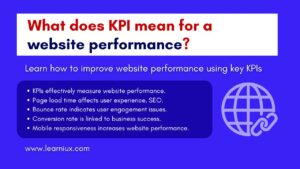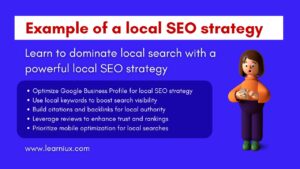Introduction
Local SEO is a specialized digital marketing strategy designed to help businesses attract customers in a specific geographic area. Unlike traditional SEO, which focuses on improving visibility in broad search results, local SEO targets location-based searches to connect businesses with nearby customers. For example, when someone searches for “best coffee shop in Mumbai” or “plumber near me,” local SEO ensures that your business appears prominently in those results. But how do you know if your business needs local SEO? This comprehensive guide explores the key signs, benefits, and steps to take to determine whether investing in local SEO is the right move for your business.
With the rise of mobile search and location-based queries, local SEO has become a critical tool for small and medium-sized businesses, especially those with physical locations or service areas. By optimizing your online presence for local searches, you can drive more foot traffic, generate leads, and build stronger relationships with your community. This article will help you assess your business needs and understand why local SEO can be a game-changer for your growth.
Why Local SEO is Important for Businesses
Local SEO is essential because it aligns your business with the way modern consumers search for products and services. Most people use search engines like Google to find local businesses, often including location-specific terms in their queries. For example, a customer searching for “fresh bakery near me” in Bengaluru expects to see results for bakeries nearby, not bakeries in another city. Local SEO ensures that your business ranks high in these searches, making it easier for potential customers to find you.
Beyond visibility, local SEO builds trust and credibility. When your business appears in local search results, Google Maps, or online directories, it signals to customers that you are a legitimate and relevant option. Additionally, local SEO is cost-effective compared to traditional advertising, as it targets a specific audience that is actively searching for your services. For businesses that rely on local customers, optimizing for local SEO can increase inquiries, store visits, and sales.
Understanding the importance of local SEO is the first step. The next step is to determine whether your business fits the profile of those who stand to benefit the most from it.
Who Benefits Most from Local SEO
Not every business needs local SEO, but certain types of businesses can benefit significantly from it. If your operations are tied to a specific location or customer base, local SEO can be a powerful tool to increase your visibility and attract the right audience. Here are the main types of businesses that can benefit from local SEO.
Businesses with physical storefronts, such as retail stores, restaurants, gyms, or salons, rely heavily on local customers. For example, clothing boutiques in Delhi need to appear in searches like “women’s clothing in Delhi” to attract shoppers. Local SEO ensures that these businesses appear in map results and local listings, guiding customers directly to their doorstep.
Service-based businesses with defined service areas also thrive with local SEO. Professionals like electricians, plumbers, tutors, or house cleaners often provide services in specific neighborhoods or cities. By optimizing for keywords like “carpenter in Pune,” these businesses can connect with clients in their target area, ensuring that their marketing efforts are focused and effective.
Additionally, businesses that are connected to local events or communities, such as caterers, event planners, or florists, benefit from local SEO. For example, wedding planners in Chennai can optimize for “wedding planners in Chennai” to attract customers who are planning local events. By matching community-specific searches, these businesses can reach a highly relevant audience.
If your business falls into one of these categories, local SEO can be an important component of your marketing strategy. But even if you’re not sure, there are certain signs that local SEO is a priority.
Signs Your Business Needs Local SEO
Recognizing the signs your business needs local SEO can help you prioritize your marketing efforts. These indicators reflect how customers find your business and whether your online presence aligns with their search behavior. Here are some key signs to look out for.
One clear sign is whether your customers are using location-specific search terms. If people are searching for “dentist in Hyderabad” or “pizza delivery in Kolkata” and your business provides those services, local SEO is essential to capturing that demand. You can use tools like Google Trends or Google Keyword Planner to confirm whether local search terms are popular in your industry and area.
Another sign is your reliance on foot traffic. Businesses like cafes, bookstores, or fitness centers rely on walk-in customers. If your revenue is tied to people visiting your physical location, local SEO can ensure you appear in “near me” search and map results, making it easier for customers to find you.
If your competitors are outperforming you in local searches, this is a strong indication that you need to invest in local SEO. For example, if a competing gym in Bengaluru is ranking higher than “gym in Bengaluru,” they are likely using local SEO strategies such as optimizing their Google Business Profile or targeting local keywords. Falling behind in these rankings can be costly for your customers.
Limited or missing online reviews are another red flag. Customer reviews are an important component of local SEO, as they influence both search rankings and customer trust. If your business has few reviews or an unclaimed profile on platforms like Google Business Profile, you’re missing out on opportunities to build credibility and improve your local SEO performance.
If your website analytics show low traffic from local visitors, it’s a sign that your online presence isn’t reaching your target audience effectively. Local SEO can help close this gap by optimizing your site for location-based searches, driving more relevant traffic to your business.
How to Assess Your Local SEO Needs
To confirm whether local SEO is necessary, you need to assess your business’s current online performance and potential opportunities. This includes analyzing data, reviewing your online profile, and researching market trends. Here’s how to effectively assess your local SEO needs.
Start by analyzing your website traffic. Tools like Google Analytics can show you where your visitors are coming from geographically. If you’re seeing a lack of local visitors despite serving a specific area, it’s a sign that your local SEO efforts need improvement. For example, a pet store in Mumbai should see a significant portion of its traffic from users in Mumbai. If not, optimizing for local SEO can help you attract the right audience.
Next, review your Google Business Profile. This free tool is a cornerstone of local SEO, as it enables your appearance in Google Maps and local search results. Make sure your profile is claimed, complete, and up-to-date with accurate details like your business name, address, phone number, and hours. An incomplete or unoptimized profile can significantly limit your visibility in local searches.
Another important step is to evaluate keyword opportunities. Use tools like Google Keyword Planner or Ahrefs to identify local search terms that are relevant to your business. For example, a hair salon in Bengaluru might use tools like “haircut in Bengaluru” or “best salon in Bengaluru.” If these keywords have high search volumes, it’s a clear indication that local SEO can drive meaningful traffic to your business.
You should also evaluate your online reviews and local citations. Citations are mentions of your business’s name, address, and phone number on directories like JustDial or Yelp. Inconsistent or missing citations can hurt your local SEO rankings, so make sure your information is accurate across all platforms. Similarly, encourage customers to leave reviews and respond to them promptly to increase your credibility and ranking.
Consider your competition. Search for local keywords related to your business and see who is at the top. If competitors consistently appear higher than you, they may be investing in local SEO strategies. This competitive analysis can highlight gaps in your approach and highlight the need for local SEO.
Benefits of Investing in Local SEO
Investing in local SEO offers many benefits to businesses targeting local customers. Understanding these benefits can help you prioritize local SEO and allocate resources effectively.
One major benefit is increased visibility in local searches. By optimizing for local SEO, your business appears higher in search results for location-based queries like “bookstores in Delhi.” This visibility ensures that more potential customers find your business when they are actively searching for your products or services.
Local SEO also drives greater engagement with nearby customers. When your business appears in Google Maps or local listings, customers are more likely to click, call, or visit. For example, a restaurant optimized for local SEO may see more reservations from users searching for “restaurants near me” on their phones.
Another benefit is cost-effectiveness. Compared to broad advertising campaigns, local SEO targets specific, high-intent audiences, making it a more efficient use of your marketing budget. Small businesses in particular benefit from this focused approach, as it allows them to compete with larger brands in their local market.
Local SEO also builds customer trust. A well-optimized Google Business Profile with positive reviews and accurate information signals credibility to potential customers. People are more likely to choose a business with a strong local presence and glowing reviews, which is what local SEO helps you achieve.
Local SEO supports long-term growth. By building a strong online presence in your community, you lay the foundation for sustainable customer acquisition. As more people discover and engage with your business, you can build loyalty and establish yourself as a trusted local brand.
Common Mistakes to Avoid in Local SEO
While local SEO offers significant benefits, common mistakes can undermine your efforts. Avoiding these mistakes will ensure that your local SEO strategy is effective and delivers results.
One common mistake is inconsistency in business information. Your business name, address, and phone number (NAP) should be consistent across your website, Google Business Profile, and online directories. Inconsistencies like different phone numbers or misspelled addresses can confuse search engines and lower your local SEO rankings.
Another mistake is ignoring customer reviews. Reviews are a key ranking factor in local SEO, and failing to encourage or respond to them can hurt your performance. Actively engage with customers by asking for feedback and professionally addressing both positive and negative reviews.
Ignoring mobile optimization is a key mistake. Many local searches occur on smartphones, with users searching for businesses on the go. If your website isn’t mobile-friendly, you risk losing customers and hurting your local SEO rankings. Make sure your site is responsive, fast-loading, and easy to navigate on all devices.
Another mistake is to neglect local keyword research. Targeting generic keywords like “best bakery” instead of “best bakery in Chennai” can undermine your efforts. Focus on keywords that reflect how your customers search locally.
Your Google Business Profile can be limited if you don’t update it regularly. Outdated hours, incorrect contact details, or missing photos can deter customers and hurt your rankings. Make it a habit to review and refresh your profile to keep your local SEO performance strong.
How to Start Local SEO
If you’ve decided that your business needs local SEO, the first step is easy to take. Start by claiming and optimizing your Google Business Profile. Fill out each section with your business category, description, hours, and high-quality photos. Post regular updates like promotions or events to keep your profile active.
Next, do keyword research to identify local search terms that are relevant to your business. Include these keywords in your website’s content, meta description, and title tags. For example, a gym in Pune could create a blog post titled “Top Fitness Tips from the Best Gyms in Pune” to target a local audience.
Build local citations by listing your business on reputable directories like Justdial, Sulekha, or Yelp. Make sure your NAP information is consistent across all platforms to increase your local SEO credibility.
Encourage customers to leave reviews and respond to them promptly. Positive reviews not only improve your rankings, but they also attract more customers. Consider offering incentives like discounts to customers who leave feedback.
If your budget allows, consider working with a local SEO professional. They can help you develop a customized strategy, monitor performance, and stay up-to-date on the latest local SEO trends.
Measuring the Success of Your Local SEO Efforts
Once you’ve implemented local SEO strategies, you need to track their success to make sure you’re getting results. Use tools like Google Analytics to monitor website traffic from local visitors. An increase in local traffic is a sign that your efforts are succeeding.
Regularly check your rankings for local keywords. Tools like Moz or SEMrush can show you how your business ranks for terms like “florist in Bangalore.” If you’re moving up in the rankings, your local SEO strategy is working.
Monitor your Google Business Profile Insights to track actions like clicks, calls, and direction requests. These metrics show how customers are engaging with your profile and whether your local SEO efforts are driving meaningful interactions.
Keep an eye on your revenue and customer inquiries. If you see more foot traffic, phone calls, or online bookings from local customers, it’s a strong sign that your local SEO investment is paying off.
Conclusion
Local SEO is an important strategy for businesses that serve specific geographic areas or rely on local customers. Whether you run a retail store, provide local services, or cater to community events, local SEO can help you connect with and grow your audience. By identifying signs like location-specific searches, relying on foot traffic, or lagging behind competitors, you can determine whether your business needs local SEO. Assessing your needs through website analytics, Google Business Profile optimization, and keyword research can provide clarity on where to focus your efforts.
The benefits of local SEO (higher visibility, better engagement, cost-effectiveness, and increased trust) make it a worthwhile investment for most local businesses. Avoiding common mistakes like ignoring inconsistent information or reviews will ensure that your strategy is effective. By taking proactive steps and monitoring your progress, you can use local SEO to stand out in your community and attract the customers that matter most. Start assessing your local SEO needs today to unlock the full potential of your business’s online presence.
FAQs
What is local SEO and why is it important for businesses?
Local SEO is a digital marketing strategy that optimizes a business’s online presence to rank higher in location-based search results. It helps businesses attract customers from specific geographic areas, such as those searching for “restaurants in Mumbai” or “plumbers near me.” Local SEO is important for businesses with physical locations or service areas because it drives targeted traffic from nearby customers. By appearing in local search and Google Maps, businesses can increase foot traffic, inquiries, and sales. It also builds trust through relevant information and customer reviews. Unlike broad SEO, local SEO focuses on a specific audience, making it cost-effective for small and medium-sized businesses. Tools like Google Business Profile play a key role in increasing visibility. For businesses that rely on local customers, local SEO is essential to remain competitive and relevant in today’s digital landscape.
Who should invest in local SEO?
Businesses with physical storefronts, service-based operations, or connections to local communities benefit the most from local SEO. Retail stores, restaurants, gyms, and salons need local SEO to attract nearby customers looking for their services. Service providers like electricians, tutors, or cleaners who serve a specific area rely on local SEO to target customers within their radius. For example, a carpenter in Pune can optimize for “carpenter in Pune” to reach local homeowners. Businesses that cater to local events, such as caterers or florists, also benefit from targeting community-specific searches. If your business relies on foot traffic or local demand, local SEO ensures that you appear in relevant searches. Online-only businesses that serve specific regions can also use local SEO to build a regional presence. Investing in local SEO helps these businesses efficiently connect with high-intent customers.
How do I know if my customers are searching locally?
To determine whether your customers are searching locally, analyze search trends and website analytics. Tools like Google Keyword Planner or Google Trends can show high search volumes in your area. Check your website traffic in Google Analytics to see if visitors are coming from your target region. If local traffic is low, it could indicate untapped potential for local SEO. Look for keywords that drive traffic to your site, such as “near me” or city names that indicate local intent. You can also monitor your competitors’ rankings for local keywords to gauge demand. Location-based search behavior can be driven by customer inquiries or feedback. For example, if customers are asking about your services in a specific city, it’s a sign that local SEO is needed. Understanding these patterns can help confirm the need for local SEO strategies.
Why does my business need a Google Business Profile for local SEO?
A Google Business Profile is a cornerstone of local SEO because it increases your visibility in Google Maps and local search results. It provides customers with important details like your business name, address, phone number, and hours, making it easy for them to find you. An optimized profile with photos, reviews, and regular updates demonstrates credibility to both customers and search engines. It allows you to appear in the “local pack” in the top three results shown for local searches. Without a claimed and updated profile, your business could miss out on these high-visibility opportunities. Positive reviews on your profile build trust and improve local SEO rankings. Regular posts, such as promotions or events, keep your profile active and engaging. For businesses that rely on local customers, a well-organized Google Business Profile is essential to increasing traffic and conversions.
How can I tell if my competitors are using local SEO?
To determine if competitors are using local SEO, search for local keywords related to your business, such as “coffee shop in Bangalore”. Check if competitors rank in the top results or appear in the local pack on Google Maps. Visit their Google Business Profile to see if they are optimized with photos, reviews, and regular updates. Consistent business information in directories like JustDial or Yelp suggests strong local SEO practices. Analyze their website for location-specific keywords in the content, titles, or meta descriptions. Tools like Moz or SEMrush can reveal competitors’ keyword rankings and backlinks from local sources. If competitors have more reviews or high engagement, they may be prioritizing local SEO. Looking at these signs can help you understand the competitive landscape and the need to invest in local SEO to stay ahead.
What role do online reviews play in local SEO?
Online reviews are a key component of local SEO, influencing both search rankings and customer trust. Positive reviews on platforms like Google Business Profile show search engines that your business is reputable, which increases your local SEO ranking. They encourage potential customers to choose your business over competitors with few or no reviews. Responding to reviews, whether positive or negative, shows engagement and builds credibility. Search engines prefer businesses with active review profiles, as they reflect customer satisfaction. Encouraging customers to leave feedback can increase review volume, which can further boost your local SEO performance. Reviews also provide valuable insight into customer preferences, which can help you improve your services. For local SEO success, proactively manage and respond to reviews to maintain a strong online reputation and attract more local customers.
How does mobile optimization affect local SEO?
Mobile optimization is important for local SEO because many local searches occur on smartphones. Users often search for “near me” services on the go, expecting fast and easy results. A mobile-friendly website with a responsive design, fast loading times, and easy navigation ensures a positive user experience, which search engines reward with higher rankings. Google prioritizes mobile-optimized sites in its mobile-first indexing, directly impacting local SEO performance. If your site isn’t mobile-friendly, you risk losing customers and lowering your rankings. Features like click-to-call buttons or map integration make it easier for mobile users to use, which increases local engagement. Test your site’s mobile performance using Google’s mobile-friendly test. For businesses targeting local customers, mobile optimization is a no-brainer to increase local SEO effectiveness and capture searchers on the go.
What are the risks of inconsistent business information in local SEO?
Inconsistent business information, such as names, addresses, or phone numbers that don’t match across platforms, can hurt your local SEO performance. Search engines like Google rely on consistent data to verify the legitimacy of your business and rank it in local searches. Inconsistencies confuse search engines, leading to lower rankings or exclusion from local results. Having conflicting details on your website, Google Business Profile, or directories like Sulekha can also lead to a loss of customer trust. This can lead to lost opportunities for clicks, calls, or visits. To avoid these risks, make sure your business’s NAP (name, address, phone number) is consistent across all online platforms. Regularly audit your listings using tools like Moz Local to identify and fix inconsistencies. Consistent information strengthens your local SEO efforts and builds customer trust.





















































